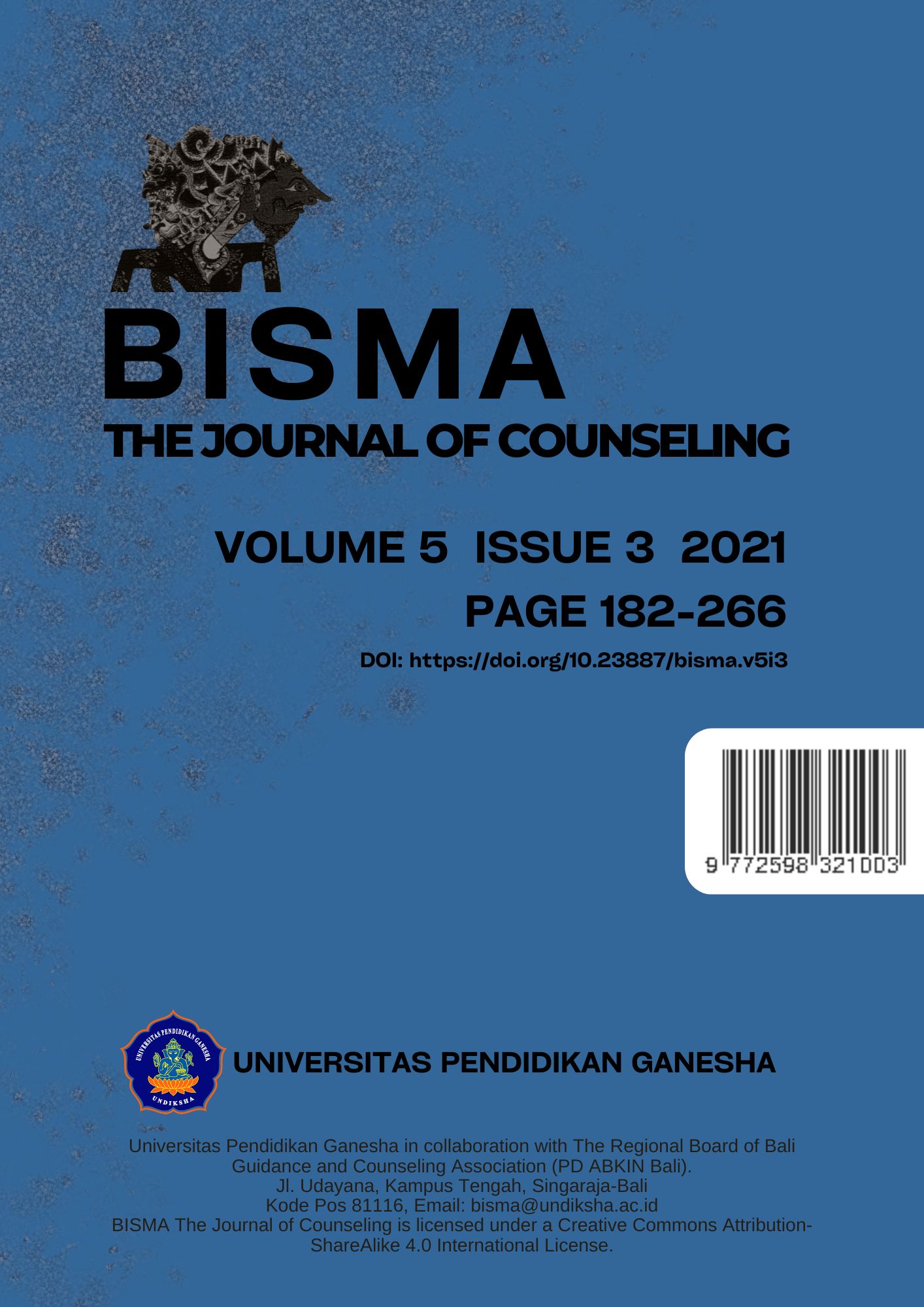Forming Children Character from View Person Centered and Al-Qur'an
DOI:
https://doi.org/10.23887/bisma.v5i3.37817Keywords:
Children Character, Person-Centered Counseling, Al-QuranAbstract
The child's religious's mental, and moral development is not a process that can occur quickly and be forced. Still, it must be gradual, reasonable, healthy, and following the growth, abilities, and nature of the age that is being passed. Here, parents must be able to capture the positive trends of child development to be very important. Parents' obligation is to motivate and direct children to a positive outcome, even though the tendency is not following the parents' wishes. This, Islam teaches that in caring for children not to differentiate between boys and girls, eldest or youngest children, normal or abnormal children, parents still provide the same opportunity to obtain educational services following their potential, talents, and interests. Children must be treated fairly and not discriminatory. Hadith of the Prophet Muhammad says that "Educate your children (girls and boys), not according to your wishes, because they are children of their time.References
Integrated Curriculum at Elementary Education Level in Medan City," International Journal on Language, Research and Education Studies, vol. 1, no. 2, pp. 298-311, 2017.
A. Trisiana, "A New Paradigm of Character Education During Covid-19 Pandemic: Comparative Analysis Towards Digital Revolution," in The 1st International Conference on Character Education, Semarang, 2020.
C. R. Lochmiller and J. N. Lester, An Introduction to Educational Research: Connecting Methods to Practice, California: SAGE Publications, Inc, 2017.
D. Knox, C. Schacht and I. J. Chang, Choices in Relationships, 13th Edition ed., Singapore: SAGE Publications, 2019.
E. S. Cahyaningrum, S. Sudaryanti and N. . A. Purwanto, "Pengembangan Nilai-Nilai Karakter Anak Usia Dini Melalui Pembiasaan dan Keteladanan," Jurnal Pendidikan Anak, vol. 6, no. 2, pp. 203-213, 2017.
G. Corey, Theory and Practice of Counseling and Psychotherapy, Enhanced, 10th Edition ed., Boston: Cengage Learning, 2017.
G. Corey, Theory And Practice Of Counseling And Psycoteraphy, 2nd Edition ed., California: Brooks/Cole publisher Company, 1982.
G. Komalasari, E. Wahyuni and . K. Karsih, Teori dan teknik konseling, Jakarta : Indeks, 2011.
H. C. A. Kistoro, . C. Setiawan, E. Latipah and H. Putranta, "Teacher’s Experiences in Character Education for Autistic," International Journal of Evaluation and Research in Education, vol. 10, no. 1, pp. 65-77, 2021.
J. Obrovská and K. S. Janků, "Resilience capacity and supportive factors of compulsory education in ethnic minority families: mixed methods study of Czech Roma mothers," Contemporary Social Science, 2021.
K. A. R. Indonesia, Al-Qr'anul Karim, Banyuianyar: Zyyad Books, 2014.
M. I. Llanos, L. A. Zapardiel and C. Rodríguez, "Children’s first manifestations of cognitive control in the early years school: the importance of the educational situation and materiality," European Journal of Psychology of Education, 2020.
M. Mulawarman, E. P. Nugraheni, . A. Putri and T. Febrianti, Psikologi Konseling: Sebuah Pengantar Bagi Konselor Pendidikan, Jakarta: Prenada Media, 2020.
M. Surya, Bina Keluarga, Semarang: Aneka Ilmu, 2003.
N. M. Ardoina and A. W. Bowersb, "Early childhood environmental education: A systematic review of the research literature," Educational Research Review, vol. 31, 2020.
R. L. Gibson, Introduction To Counseling And Guidance, 7th Edition ed., New Delhi: Prentice-Hall Of India Pvt. Limited, 2008.
S. N. Z. Niswah, A. W. Pudjastawa and S. Endraswara, "Moral Teaching in Piwulang Manuscript and Its Relevance to The Teaching of Character Education in Indonesia," in The 1st International Conference on Character Education, Semarang, 2020.
S. Soedarmadji and H. Hartono, Psikologi Konseling, Jakarta: Prenadamedia, 2015.
S. Tao, A. Peng and X. Chen, "“Being So Caught up”: Exploring Religious Projection and Ethical Appeal in Leda and the Swan," Religion Journal, vol. 12, no. 2, pp. 1-21, 2021.
T. Triyanto and T. Rejekiningsih, "Building Tolerance Character for Students in the Digital Era," in The 1st International Conference on Character Education, Semarang, 2020.
Willis, Konseling Individual, Teori dan Praktek, Bandung: Alfabeta, 2015.









